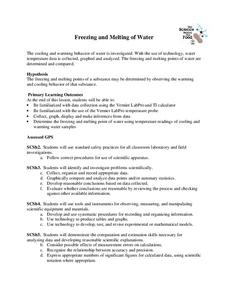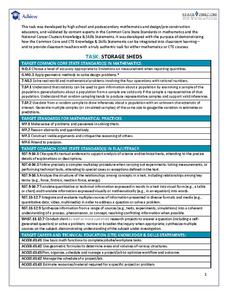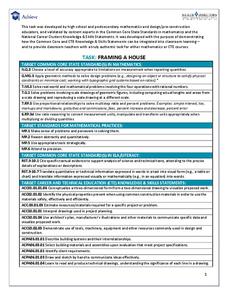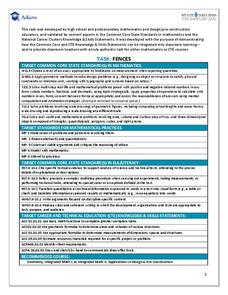Curated OER
Are Our Chemical Measurements Accurate or Precise?
What is the difference between accuracy and precision? This instructional activity has students define the terms accuracy and precision, and compare bulleye diagrams to find examples of both. Students analyze given data and determine the...
Curated OER
Measuring for Chemistry: Moles, Compounds, and Conversions
Through a station rotation activity, scientists complete 9 chemistry activities to complete this interactive worksheet. Concepts include molar masses, percent composition, accuracy vs. precision, mass of an object, scientific notation,...
Cornell University
Fibers, Dyes, and the Environment
Nanofibers can be made through electrospinning or force spinning in order to reduce the negative impact on the environment. Pupils study the role of fibers and dye on the environment through a series of five hands-on activities. Then,...
Curated OER
Precise Diode Circuits
In this electrical circuit worksheet, students construct a model of a diode circuit to demonstrate understanding. They analyze schematics and answer a series of 13 open-ended questions about diode circuits. This worksheet is printable...
Curated OER
Measurements and Their Uncertainty
In this measurements worksheet, students fill in 10 blanks, determine if statements are true or false, match 6 terms with the appropriate definitions, and solve 2 problems. Topics include converting to scientific notation, identifying...
Royal Society of Chemistry
Significant Figures
Ready to add some innovation to your significant figures lesson? Pupils practice sig fig rules using a puzzle approach. Check out the Teacher's Area for printable materials, an answer key, and strategies for implementing the resource.
Curated OER
What Can We Measure about Chemicals?
In this measuring chemicals worksheet, students determine the accuracy and precision of measurements and distinguish between the two. They find the percent composition of compounds, the molar mass of compounds and the volume of gases at...
Curated OER
What Can We Measure About Chemicals?
In this measurement worksheet, students read about accuracy of measurements as compared to the precision of measurements. Students answer four precision problems and solve four accuracy problems.
University of Georgia
Freezing and Melting of Water
Examine the behavior of energy as water freezes and melts. An engaging activity provides a hands-on experience to learners. Collaborative groups collect data and analyze the graphs of the temperature of water as it freezes and then...
Curated OER
Data Collection Review Sheet
In this data collection worksheet, students determine the number of significant figures in the given values, describe the difference between accuracy and precision, and calculate density and mass. This worksheet has 1 short answer...
Curated OER
DC Metrology
In this physics worksheet, students complete 11 short answer questions related to general metrology. They define basic metrological terms.
Curated OER
What Can We Measure About Chemicals?
In this measuring chemicals instructional activity, learners investigate measurements of an aluminum slab including the length, width, height, mass, volume and density. They do the same for a piece of aluminum foil and they compare their...
Curated OER
Molarity Labs I & II $ III
In this molarity lab worksheet, students write down the process they took to determine the molarity of a given sample of a solution of salt. They also make two particular molar solutions in the lab and show their calculations. They answer
Curated OER
Vocabulary - Introduction to Chemistry
In this chemistry vocabulary worksheet, learners use their textbooks and dictionaries to find the definitions to 20 terms associated with chemistry.
Curated OER
Design Project: Simple component curve-tracer circuit
In this circuit worksheet students complete a series of short answer questions on using a tracer circuit. There are answers with this worksheet.
Achieve
Rabbit Food
Keep your pets slim, trim, and healthy using mathematics! Pupils use a linear programming model to optimize the amount and type of food to provide to a pet rabbit. They model constraints by graphing inequalities and use them to analyze a...
Achieve
Task: Storage Sheds
Bridge the gap between mathematics and Career Technical Education. Pupils research the cost associated with building storage sheds and analyze possible profit. They build scale models and determine if building and selling the sheds is a...
Achieve
Framing a House
If members of your class wonder where they can use the math they learn in middle school, let them discover the answer. Learners apply geometry concepts of scale and measure to calculate the costs of framing a house addition.
Achieve
Dairy Barn
Agriculture is truly a math-based profession! Help the dairy farmer determine the supplies needed to complete his barn. Using given dimensions, learners build equations and use units to determine the correct amount of materials.
Achieve
Fences
Pupils design a fence for a backyard pool. Scholars develop a fence design based on given constraints, determine the amount of material they need, and calculate the cost of the project.
Achieve
Corn and Oats
How much land does a parcel hold? How much fertilizer does it take for a field of corn? Pupils answer these questions and more as they apply ratio reasoning and unit analysis.
Achieve
Yogurt Packaging
Food companies understand how to use math to their advantage. Learners explore the math related to the packaging and serving size of yogurt. They then use unit analysis and percent values to make decisions on the product development.
CK-12 Foundation
Ck 12: Physical Science: Accuracy and Precision
[Free Registration/Login may be required to access all resource tools.] Accuracy and precision of measurements.
Science Buddies
Science Buddies: Measuring Up
Measurements are very important for scientists. It is especially important that the measurements be accurate. Think about how important accuracy is when you want to know if you are taller than a friend of yours, every inch counts. In...

























